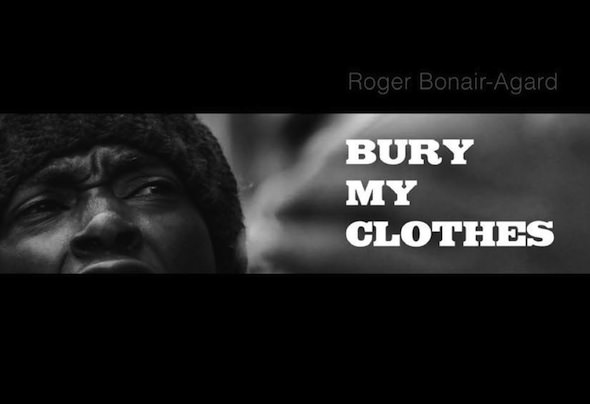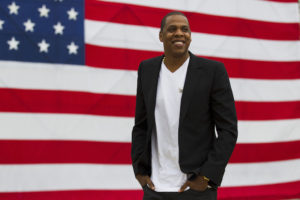|
To see long excerpts from “Bury My Clothes” at Google Books, click here.
|
“Bury My Clothes”
A book by Roger Bonair-Agard“The poet knows all sorts of things. Right now,
he is convinced he is inside the belly of his greatest
work ever. Rum will do that.”
“Bury My Clothes,” a new book of poetry by accomplished performance poet Roger Bonair-Agard (and on the longlist for the 2013 National Book Award for poetry), is a volume of old stories made fresh through language and passion. These pages involve us as we read them and demand to be spoken and sang. The title comes from lyrics sang by the great 1930s calypso singer Growling Tiger: “When ah dead, bury meh clothes/ah doh want no sweet man to wear meh clothes.” Growling Tiger was a boxer-turned-singer whose political and social passions are an apt reference to kick off this new collection.
“I’m trying to tell you what I know of poetry:
how I learned to talk, and how there was
always a stage involved… If I tell
you this is a language only translatable
as drum, you will say you have heard this before…”
The poems offer clear challenges and vibrant personal stories, resonant as any steel pan instrument. Beginning in Trinidad, the book evolves into a complete meditation on identity, place and race. Bonair-Agard doesn’t shy away from the violence of being black in America:
“Your body is a constant negotiation
amongst power’s several microagressions”
The first pages of the book, unfortunately, are weighed down with an unnecessary foreword by Brooklyn poet Patrick Rosal. I recommend skipping ahead and hitting the meat of the matter. Bonair-Agard divides the book into seven sections bookended by two wonderful prose memories, starting with “Two bottles of rum and the Roaring Lion.” The drumbeat in these pages is clear and hard as a heart must be. One unfortunate detail: The section titles themselves generally lack originality (“HEART/break” is just one lamentable example), despite the uniquely forged poems in each segment.
“… The next
day the sun rose and I know
little by little love leaks
out of us all through the mouths
of prophets.”
Throughout “Bury My Clothes,” Bonair-Agard examines the perilous quest for identity, executing an elegant balance between beauty and threat, highlighted in poems such as “Ode to my Brooklyn fitted.” The “Odes” section, lyric addresses to various people and objects, might have benefited from being spread throughout the book, rather than having a single clump of “Odes” in one somewhat heavy-handed section. But overall, the book works as a well-orchestrated piece of music — much like an album, riffing on ideas and memories, constructing story through leaps and repeating melodic themes rather than strictly chronological narrative.
The music and poetry of Trinidad — pan, drums, song-masters — throb through the book. But the work is also thoroughly anchored in America, pulling in references to hip hop artists such as the much-regretted Biggie Smalls. Bonair-Agard is adept at connective leaps from the artists of another time and place to today’s voices. For rapper Lil Wayne, for example, the poet writes:
“you tattoo Billie’s collapsed
veins on your throat”
The collection’s opening and closing prose chapters of memoir create the perfect dust jacket for the poems within. These memories conjure a Trinidad that has slipped out of our time and out of the poet’s hands: Despite his steadfast connection to place, Bonair-Agard recognizes that he is a man without a home.
“To go home
and not be recognized. To go home
and recognize nothing…”
Being an immigrant offers no solution to the dilemma of personal place:
“Brooklyn is a reluctant lighthouse,
an unwelcoming harbor…
…To come from is to belong nowhere” These poems insist on the complexity of identity, that we are many voices and moments contributing to each self — whether in low conspiratorial tones or loudly public:
“The edge of blackness must not be confused
with the edges of physical things — blades,
buildings, tables, saucers. Rather
this edge is horizon, constantly moving.”
This mobility fits with the dancing rhythm of a calypso. Yet when Bonair-Agard considers his grandfather’s farm back in Trinidad, the poet admits:
“… But this land is not for me.
It is not mine.
It never was.”
For all this, Trinidad is the source of the poet’s original inspiration. Bonair-Agard’s early awareness of the power of words is enhanced by his ease in moving between formal written and spoken language:
“This is how I learned
to talk. This talk, this calypso
the warp and weft of what it means
to be black and remember…”
The pages slip easily from the rhythm of Trinidad to the street tough vocabulary of Chicago or Brooklyn, ably jumping into the cynical voice of an all-black penguin (a tongue-in-cheek spirit animal) before switching once more into formal poetic narrative. The nature of voice itself — its sound, its vocalizations, its texture — are captured with compassion and delicacy, whether the poet is talking about one of his students in prison, or about his mother:
“Because my mother’s perfect
diction (which kept most things
audible, even in sotto voce) slid
then into a buttery whispered song;
because my mother’s voice got smoky,
low, and conspiratorial, I giggled
alone to myself…”
Above all — and here, Bonair-Agard is truly an heir to the great Kings of Calypso — this is a book about seizing self-respect. In America, respect is never a given. The poet must construct the self with his own power, using the strength of his words alongside the bravura of appearance. The cut of a shirt, the angle of a hat and the choice of a particular phrase are all crucial gestures toward self-creation:
“I was aware for the first time
that I was spectacular,
though I wasn’t yet sure
what it meant to be black
in the whole world.”
The poet claims his right to be spectacular despite living in a world that does not automatically offer him any place, any platform. As a black man, the poet must insist on his voice and identity. No wonder the book begins in Trinidad with legendary calypso singer the Mighty Sparrow. Bonair-Agard writes of the Mighty Sparrow: “He was adept at both social commentary and party favorites; his pen could cut both ways.” Clearly this is Bonair-Agard’s goal. With “Bury My Clothes,” the poet hits the esteemed mark of a Calypso King:
“He was never going to be on time and sometimes when he was in his liquors, he left the gathered anyway, but it meant that whenever he returned, he was always going to have a story to tell.”
These are stories worth telling. Let the poems sink into your ears and seep into your heart as you negotiate your own edges on the dangerous, ever-shifting line of identity and place.
Lisa Pasold is a Canadian writer based in New Orleans. Her most recent book of poetry, “Any Bright Horse,” was nominated for the 2012 Governor General’s Award in Canada.





You need to be a supporter to comment.
There are currently no responses to this article.
Be the first to respond.